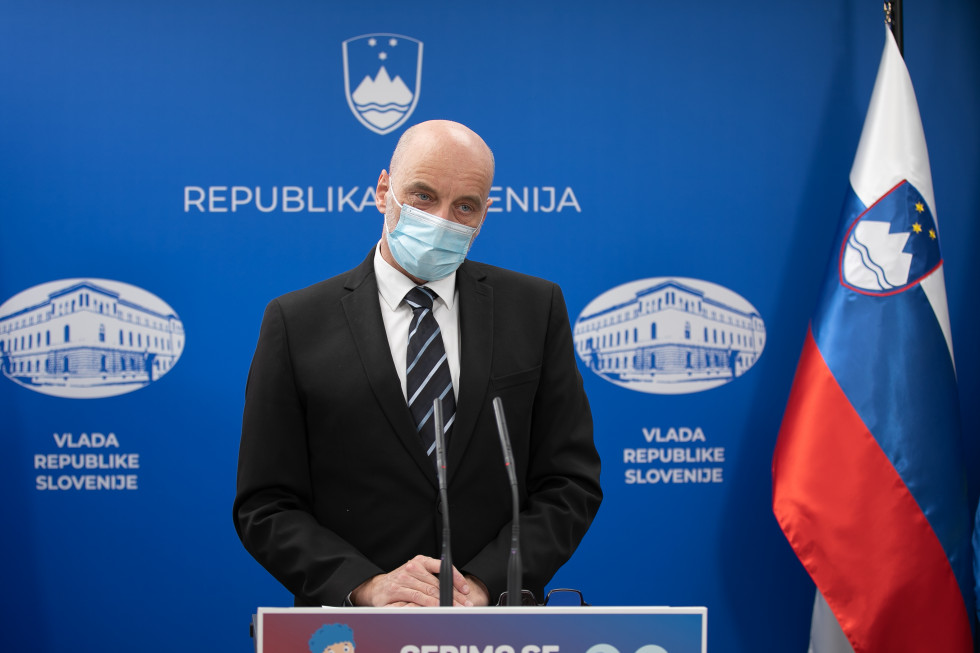Changes to the COVID-19 testing protocol

State Secretary at the Ministry of Health Franc Vindišar | Author Urad Vlade RS za komuniciranje
The State Secretary at the Ministry of Health Franc Vindišar began by presenting the current situation in COVID‑19 hospitals.
At the moment, COVID‑19 hospitals have a capacity of 648 beds. State Secretary Vindišar highlighted that the number of patients admitted to acute wards has been increasing in recent days. There are currently 12 COVID-19 hospitals in Slovenia. According to the projection, the number of hospital admissions is expected to start rising in the coming days, peaking around 2 February, which would mean around 900 occupied beds. In the case of a rise in reproduction number, 1,100 beds would be occupied.
State Secretary Vindišar further said that since the beginning of this year, the number of patients in intensive care units has slightly decreased. There are currently 155 patients in ICUs. At the moment, ten COVID-19 hospitals in Slovenia are equipped with intensive care beds. According to projections, the number of patients in intensive care units is expected to peak around 6 or 7 February, when the number is expected to rise to 200 or potentially even to 250.
State Secretary Vindišar continued with a presentation on the changes to the COVID‑19 testing protocol.
He said that the changes to the protocol are intended to ensure a sustainable laboratory system which would, despite the sharp increase in COVID‑19 cases, ensure priority access to these tests for all hospitalised patients and patients with health problems potentially requiring hospitalisation. State Secretary Vindišar noted that the viral burden in society is so high that any person with a respiratory infection must self-isolate both while waiting for the swab test and while waiting for the swab test results.
According to the new protocol, people with respiratory diseases will be divided into two groups:
- the first group are patients with a chronic disease, immunocompromised, children and pregnant women, who should inform their personal physician who will then order a PCR test for them,
- the second group must first take the rapid antigen test. People with symptoms and a negative rapid antigen test result should self-isolate for three days. If the symptoms go away, it is possible to say that the person is not positive for the novel coronavirus.
However, if health problems persist, the patient should ask the physician to order them a PCR test. If the PCR test result is positive, the person should self‑isolate for ten days and obtain a QR code. Due to an increased number of PCR tests, the results will be known within 48 hours at the latest. At the same time, the State Secretary stressed that everyone has to wait for the test result in self-isolation.
He concluded by calling for strict compliance with the rules, as the testing protocol has been put in place to keep society open and contain the spread of COVID‑19 infections.
Tjaša Žohar Čretnik, Director of the National Laboratory of Health, Environment and Food (NLZOH), said that the laboratory's capacity was at its upper limit, as the inflow of samples increased by 100 percent. According to her, this is the why the average time that was under six hours during the epidemic, which was a remarkable achievement in light of the European situation, is increasing. "With such numbers, however, we can only report the results within 48 hours," she said. "It is estimated that PCR testing could be reduced by 30%-35%. At the same time, we are working to get assistance from abroad," she explained about the new protocol.
She also added that a public procurement procedure for assistance from abroad is already underway, and a European call for tenders for a foreign laboratory which would accept the tests taken by the National Laboratory for Health, Environment and Food to be processed, is being prepared.
